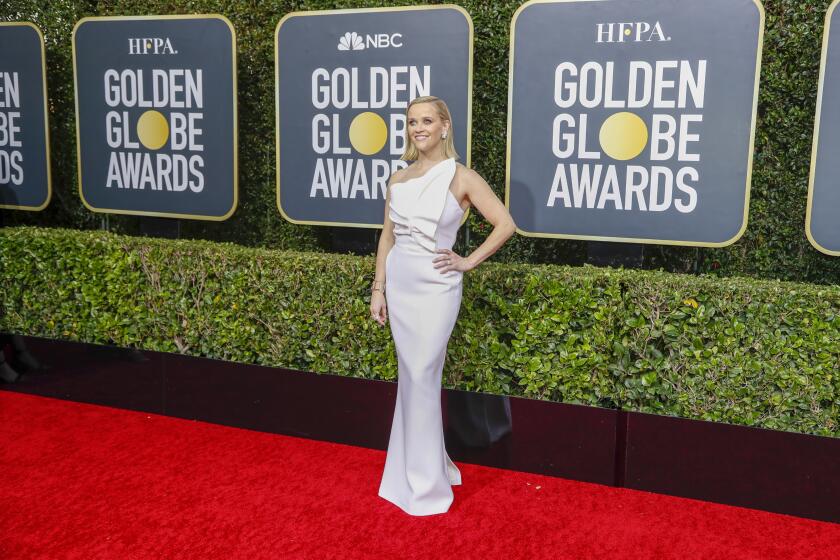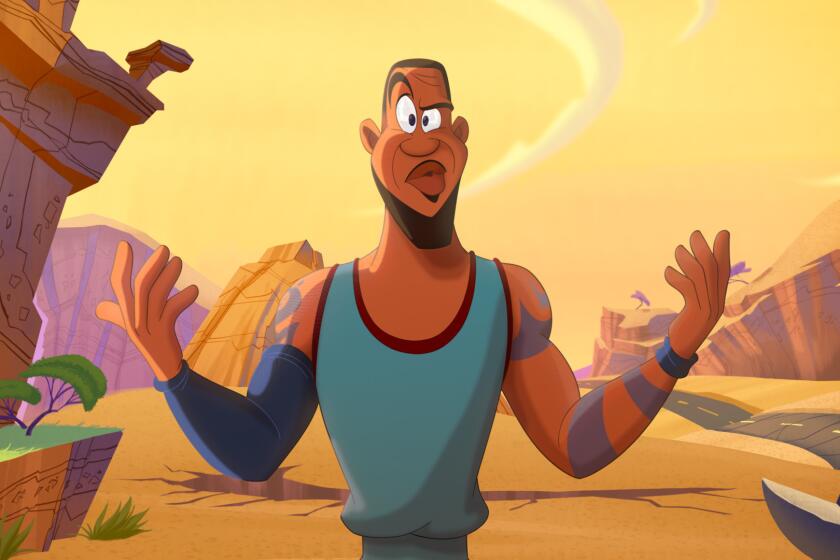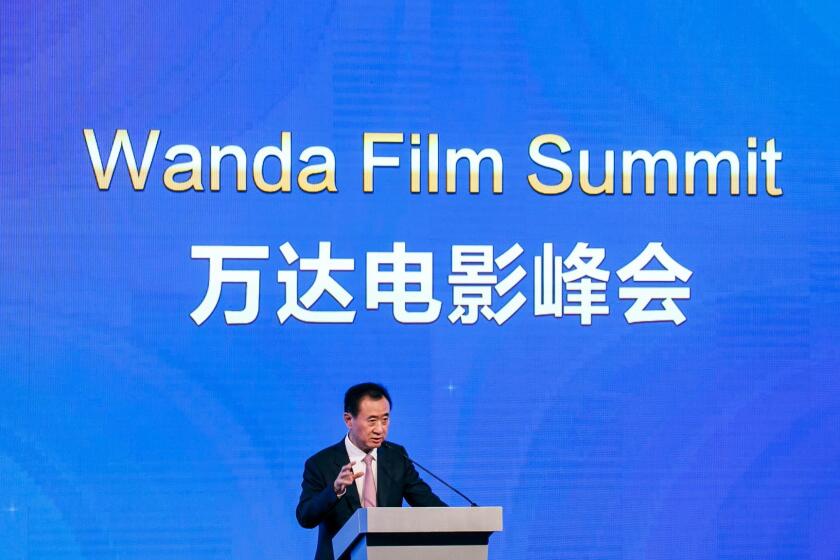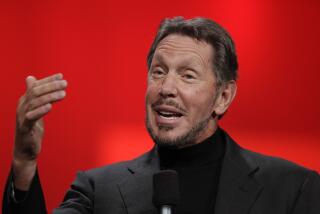‘Dune’ and ‘Godzilla vs. Kong’ studio Legendary stages a comeback. Will it fetch a buyer?

- Share via
Even for a company like Legendary Entertainment, known for taking risky bets on franchises including the recent Godzilla and King Kong movies, making “Dune” is a gamble.
The 1960s Frank Herbert novel, beloved by science fiction fans but notoriously difficult to adapt, has vexed filmmakers as accomplished as Alejandro Jodorowsky and David Lynch.
While the recently released trailer for the new $165-million Denis Villeneuve-directed film dazzled viewers online, box office analysts have questioned its broad commercial appeal. Upping the stakes, Legendary also has a TV series titled “Dune: The Sisterhood” that is planned for HBO Max.
Yet, the success or failure of “Dune,” coming to theaters and HBO Max in October, is not the biggest question looming over Burbank-based Legendary, owned by Chinese conglomerate Dalian Wanda Group.
Inside the business of entertainment
The Wide Shot brings you news, analysis and insights on everything from streaming wars to production — and what it all means for the future.
You may occasionally receive promotional content from the Los Angeles Times.
Speculation is swirling that Legendary will soon be sold amid a larger gold rush for content. Sellers want to capitalize on the demand for more film and TV content to put on streaming services, which are spending billions of dollars a year to compete for subscribers.
Amazon is buying MGM Studios for $8.45 billion, pending regulatory approval. A24, Brian Grazer and Ron Howard’s Imagine Entertainment and LeBron James’ SpringHill have all been floated at lofty valuations.
Reese Witherspoon’s Hello Sunshine, known for “Big Little Lies,” sold at a value of $900 million to a Blackstone-backed media company run by former Walt Disney Co. executives Kevin Mayer and Tom Staggs. They also looked at Legendary, but talks didn’t go anywhere according to people familiar with the matter.
As one of the few remaining independent producers of movies and television shows, Legendary represents a potentially attractive asset for companies looking to bulk up their offerings.
Bloomberg first reported in April that Legendary has been working with investment bank LionTree LLC to explore options, including a merger with a publicly traded special purpose acquisition company, or SPAC. Financial sources questioned whether going public through a SPAC makes sense for Legendary, given the uncertain fortunes of the movie business.
A deal may not happen at all, people familiar with the matter said.
The production company behind ‘Big Little Lies’ will be majority owned by a new media company backed by ex-Disney executives Kevin Mayer and Tom Staggs and private equity giant Blackstone.
Legendary Chief Executive Josh Grode wouldn’t comment on specific talks.
“We get multiple inbound calls on a weekly basis, both from the actual parties and from bankers,” Grode said. “We always listen to what people have to say. My job running the company is to maximize value for my shareholder, which is Wanda, and that’s what I will always look to do.”
Grode advised Wanda on its 2016 purchase of Legendary for $3.5 billion. He had previously worked on financing deals for Marvel and indie studio A24, as well as the formation, financing and eventual sale of Summit Entertainment to Lionsgate.
With demand for content surging, Legendary is in a strong position to compete on its own by supplying movies and TV shows to streaming services fighting for global dominance, Grode said.
“We feel the wind is at our backs,” he said. “With the increasing competition among the streamers to increase mindshare among consumers, I think we’re in a terrific position.”
Founded in 2004 by billionaire investor Thomas Tull and armed with private equity money, Legendary gained a foothold in the industry by investing in films such as “Batman Begins” and the “Hangover” films. It weathered ups and downs with successful releases like “Pacific Rim” and “300” and flops such as “The Great Wall” and “Warcraft,” which were targeted at audiences in China. Tull left the company in 2017.
Today, Legendary is on an upswing. Recent successes include selling “Enola Holmes,” starring Millie Bobby Brown, to Netflix and the release of “Godzilla vs. Kong” by Warner Bros., which has grossed $467 million worldwide and drove signups for HBO Max, where it debuted at the same time as in theaters. Television shows such as “Carnival Row” on Amazon Prime Video have also fueled growth.
Everything is frontloaded now, as studios make streaming-era tradeoffs. PLUS: Can Olympics and exorcists boost Peacock?
The company is expected to turn a profit of $100 million this year, more than doubling its net income from last year, according to people familiar with its finances who were not authorized to comment. It’s the first time the company has been profitable for two straight years since 2011. Legendary is now valued at more than $2 billion, these people said.
While Wanda may not get back what it shelled out for Legendary ($3.5 billion was widely considered overpaying), it still may be a good time to sell, analysts said. Over the last few years, Chinese companies such as Wanda have been exiting U.S.-based businesses amid government clampdowns on foreign investments. This year, Wanda sold its controlling stake in theater chain AMC Entertainment during a retail investor-fueled surge in AMC’s stock price.
“Legendary does have in its library several well-known titles that streaming services would want to have,” said Lindsay Conner, an entertainment industry lawyer at Manatt, Phelps & Phillips. “It does have a solid executive core, and it does have projects in its pipeline, which could jumpstart a buyer’s production pipeline.”
Chinese billionaire Wang Jianlin arrived in Los Angeles in October to a reception befitting a true Hollywood mogul.
Grode stepped in as CEO in 2018 after trying to recruit respected former Fox film boss Jim Gianopulos, who ended up running Paramount Pictures. Grode cut excess spending and scuttled divisions, including a low-budget reality TV arm and an analytics business. The savings allowed it to more easily start production of movies and shows, even during the COVID-19 pandemic.
In TV, the company is making “Paper Girls,” based on Brian K. Vaughan’s graphic novel, and “Lightyears,” a drama series, for Amazon. Legendary has also expanded in animation, releasing the anime series “Pacific Rim: The Black” on Netflix in March. The company is making additional anime shows based on “Skull Island” and “Tomb Raider.”
Its film division, led by “The Revenant” producer Mary Parent since 2016, diversified its development slate with more modestly budgeted fare, including “Texas Chainsaw Massacre,” which recently wrapped production, and an upcoming reboot of the B-movie classic “Toxic Avenger.” A sequel to “Enola Holmes” begins shooting in the fall.
“I think we’ve done a good job of creating what I hope is an intimate production company on one level, with the perks of a global company on another,” Parent said. “You sleep better at night when you’ve got some tent poles, but at the same time, I don’t think people would think of us making a $12 million film, and that’s exciting.”
The company in March wrapped production on “Fresh,” a dark social thriller based on a spec script that producers Adam McKay and Kevin Messick brought to Parent.
A few years ago, Legendary was one of the last places a filmmaker would take a small-budget project with an edgy concept. McKay, director of best picture nominees “The Big Short” and “Vice,” credited Parent with seeing the dark, socially conscious creative vision of “Fresh,” helmed by first-time feature director Mimi Cave. Not everyone did.
“It’s very rare to find someone who can feel the direction of the breeze in the air, and she’s definitely got that,” he said. “If you get what that movie is about and you’re aware of the world at large, you get it. If you don’t, you’re terrified.”
In another key move, Legendary launched an international television arm in 2020 to take advantage of the growing appetite for local language production. Former HBO and Starz executive Chris Albrecht, who joined the company in 2019, leads its television division.
Grode wanted to make sure the TV and film sides of the business worked closely together when evaluating whether to take on certain potential franchises. When Legendary considers whether to take on a new piece of intellectual property, the company puts it through what Grode calls an “I.P. value sifter,” which is a process for determining whether an idea has the juice to work in both TV and film, no matter which comes first.
Take “Toxic Avenger,” a cult B-movie franchise launched by iconoclast Troma Entertainment in 1984. The company thought it made sense as a film property, given that the original spawned multiple sequels. Legendary also saw potential in an idea to build a show around “Nuke ‘Em High,” the high school based in the fictional town of Tromaville.
“It sifts out a lot of the stuff we should be staying away from,” Grode said of the company’s process. “That’s really one of the structural benefits that we put in place.”
Many entertainment companies say they do this. But Albrecht said the strategy goes beyond corporate happy talk.
“Legendary is the first place I’ve come where film and television are actually integrated from the ground up,” Albrecht said. “Having done this for a long time, I can tell you it’s not only unique, it’s exciting.”
Unlike the major studios, Legendary doesn’t control the distribution of its films and TV shows. Its movies for years were released by Warner Bros., where it had a co-financing and co-producing deal. It later went to Universal Pictures where Legendary invested in blockbusters such as “Jurassic World.” But after a run that included the disappointing Dwayne Johnson action flick “Skyscraper,” Legendary returned to Warner Bros. for a first-look pact.
Not having its own distribution can produce headaches. Legendary was among the creative partners thrown for a loop when WarnerMedia in December abruptly said it would debut its 2021 movies simultaneously in theaters and on HBO Max, including “Godzilla vs. Kong” and “Dune.” Especially upset about the simultaneous release plan was Villeneuve, who blasted the WarnerMedia decision in a Variety op-ed.
WarnerMedia CEO Jason Kilar has publicly acknowledged he should have given creative partners more of a heads-up. WarnerMedia ended up paying more than $200 million to top creators to make good with talent, avoiding a bigger public blowup like when Scarlett Johansson recently sued the Walt Disney Co. over “Black Widow’s” hybrid release in theaters and on Disney+.
PLUS: Peacock gets eyeballs. But Olympics viewers are confused.
Villeneuve, known for ambitious films such as “Arrival” and “Blade Runner 2049,” praised Legendary for supporting him through the ordeal.
“That was the true test of the relationship,” Villeneuve said. “I felt that we were a team and I felt that they were there to support me in that difficult moment of the distribution of the film. I felt the deep respect of Josh and Mary toward me. It just increased my appreciation and it increased my trust in them. They are warriors and they were there to support the movie big time.”
Parent recruited Villeneuve in 2016 after seeing a Variety Q&A with the French Canadian director in which he described “Dune” as his dream project. Parent had only recently joined the company, which had acquired the film rights to the sci-fi classic. After their first meeting, both sides were on board.
Warner Bros. angered Hollywood with its decision to put movies in theaters and on streaming service HBO Max simultaneously. It now faces a turning point as the studio’s parent company prepares its film strategy for the streaming age. In the background, a new owner: Discovery.
“He was one of just a handful of filmmakers at the tiptop of the list that you would go make this with,” Parent said.
While “Dune,” starring Timothée Chalamet, was in the works before Grode took over, the property brings out the sci-fi nerd in the attorney. He recalled joking to Villeneuve about the exacting attention to detail the auteur brought to the elaborate global production, which spanned Budapest, Jordan, Norway and Abu Dhabi.
“I said, ‘you actually went into the desert and pulled out the grains of sand if you didn’t like the way they looked,’ that’s how particular he was on this movie,” Grode said. “I’ve seen the movie now multiple times. Cinematically, it’s amazing, if there was ever a movie to be enjoyed on the big screen, this is the movie.”
More to Read
Inside the business of entertainment
The Wide Shot brings you news, analysis and insights on everything from streaming wars to production — and what it all means for the future.
You may occasionally receive promotional content from the Los Angeles Times.















